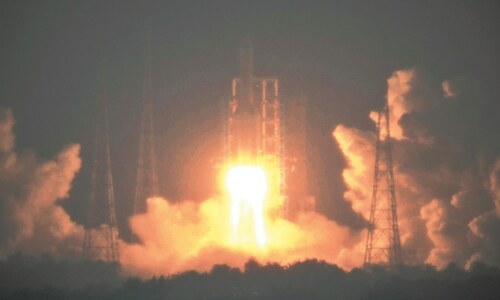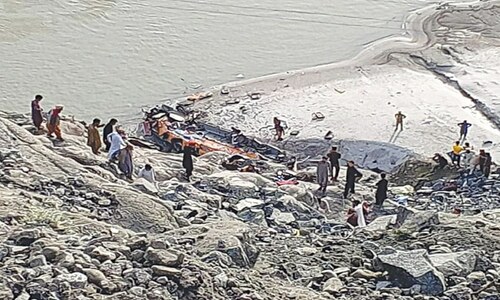ISLAMABAD: Justice Yahya Afridi on Thursday observed that the Supreme Court was always careful in exercising its advisory jurisdiction and suo motu powers since no appellate forum was provided against its determination besides such proceedings were also not adversarial.
“Under similar question over the Hisba Bill, the Supreme Court has already held that the opinion of the court on a question referred to it under its advisory jurisdiction is binding,” said Justice Afridi, a member of the five-judge apex court bench.
Headed by Chief Justice of Pakistan Gulzar Ahmed, the bench was hearing a presidential reference through which President Dr Arif Alvi has sought explanation whether the condition of secret ballot under Article 226 of the Constitution applies to Senate elections or not.
Attorney General for Pakistan (AGP) Khalid Jawed Khan argued that the apex court never decided political questions and that was the reason why it asked parliament to move a resolution regarding acceptance of Bangladesh. But the Supreme Court had always come up with robust views on conflicting issues, the AG said and posed a counter-question by asking would the apex court allow somebody if he claimed himself to be a Khalifah and imposed a Caliphate rule in the country.
Observation comes during hearing of presidential reference seeking open ballot for Senate polls
There was a turf war in 1993 between the then president and the prime minister and though the president had the authority to dissolve the National Assembly, the Supreme Court restored the assembly with an observation that if there was a political war between the two then they should fight it out somewhere else, recalled the AGP.
The AGP said that the president had referred the matter to the Supreme Court since it was not the job of the parliament to interpret the Constitution though it could amend it.
“This is the exclusive prerogative of the Supreme Court,” the AGP emphasised, saying the US Supreme Court had also decided the famous George Bush versus Al Gore case though it did not have advisory jurisdiction.
At this, Justice Ijaz-ul-Ahsan observed that the government was asking the Supreme Court to interpret the constitution for the people of Pakistan.
Referring to the political question — a point which Justice Afridi had raised — the AGP cited the 1997 Supreme Court verdict rendered by a seven-judge in the Mahmood Khan Achakzai case which had held that political question would not deter the court from determining it provided it involved interpretation of the constitution.
The court should not adopt ‘political question doctrine’ for refusing to determine difficult and knotty questions having political overtones, the verdict had stated, adding this would amount to abdication of judicial power which was allowed neither by the constitution nor by the law, the AGP said.
The Supreme Court had always adopted the option of interpreting the constitution and then left the matter to the parliament, he said, adding in the Hisba Bill case, a nine-judge Supreme Court bench had laid down the ambit and domain of the court and they were bound by the precedence set by the court.
“It is a different matter that a larger bench may take a different view in future but when a nine-judge bench say something it carries weight,” the AGP said.
This is the privilege of the Supreme Court to answer a question referred to it in whichever manner but the option to simply refer the same back to the parliament without interpreting it was not available to the court, the AGP emphasized.
Justice Umar Ata Bandial observed that they were going into lot of nomenclature but needed to look at the jurisprudential scope of the matter.
The AGP contended that the Supreme Court should interpret the provision in a manner which should advance the constitutional scheme that helped bring purity and transparency in Senate elections.
He also cited 1992 Punjab government versus Ziaullah Khan case in which it was held that any provision under the constitution could not be repealed through a statute.
When AGP cited the example of Article 175 of the Constitution, Justice Ahsan observed that the Supreme Court and the high courts were established under the constitution and therefore no order could be passed to repeal these courts through ordinary laws.
Referring to the Senate elections, the AGP emphasised that by operation of the constitution, if the machinery was provided in the constitution then such elections were under the constitution.
He contended that the Charter of Democracy and recommendation of the Whole Committee of the Senate had also emphasised open and traceable ballot.
The case will again be taken up on Monday.
Published in Dawn, January 15th, 2021














































